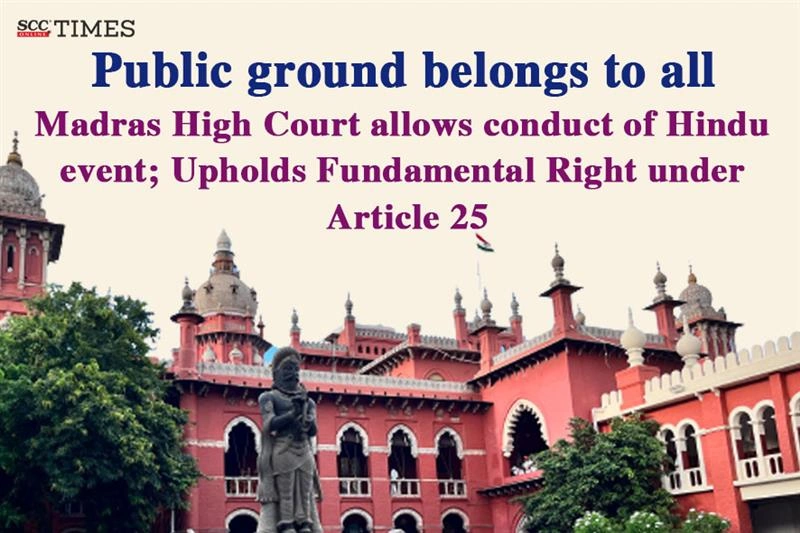Madras High Court: In a petition filed by a resident of N. Panchampatti Village, seeking permission to conduct Annadhanam (distribution of food) in a nearby public ground in connection with the Kumbabisekam of a local Hindu temple, a Single Judge Bench of G.R. Swaminathan, J., while allowing the petition, held that a public ground should be available for use by all communities or none. The Court rejected the submission that Christians could use the ground on Easter, but Hindus could not conduct Annadhanam there. It was held that exclusion based solely on religion offends Article 15 of the Constitution.
Background:
The case arose from the petitioner’s attempt to conduct Annadhanam (distribution of food) in connection with the Kumbabisekam of a Hindu temple in N. Panchampatti Village, Dindigul District, scheduled for 03-11-2025. To facilitate the event, the petitioner sought permission from the Tahsildar to use an open ground located near the temple. However, the Tahsildar rejected the request and instead allotted an alternative site, which was a public road from N. Panchampatti to Munnilaikottai. Aggrieved by the decision, the petitioner filed the present petition.
The Inspector of Police, Chinnalapatti Police Station, who was present in person, submitted that if the event was allowed to be conducted in the petition-mentioned ground, it would give rise to law-and-order issues.
The Respondent 4, representing the Christian community, submitted that on a portion of the ground in question, a stage was constructed 100 years ago and that it was known as pascha stage. Every year, during Easter festival, programs and dramas were held on the said stage, and people assembled in the ground opposite to the stage to watch the same.
According to him, Hindus were never allowed to use the ground in question for any religious purpose. He drew attention to the proceedings of the Tahsildar drawn in August 1912. The Respondent 4 also filed a detailed counter-affidavit and pointed out that in the year 2017, a peace committee meeting was convened and that it was resolved therein not to conduct any function except the ones that were permitted over the last 100 years. His specific stand was that there should not be any departure or deviation from the said stand.
In the counter-affidavit filed by the Respondent 4 himself, it was admitted that the open space in front of the pascha stage belonged to the panchayat. It was further submitted that the land in N. Panchampatti Village was classified as “vacant site / grama natham” and that it belonged to the government.
Analysis and Decision:
The Court emphasised that when the land in question was not a patta land but belonged to the Government, it should be available to all sections irrespective of religious or communal background. The Court observed that “we are a secular, democratic republic. Our Constitution came into force on 26-01-1950. Any pre-constitutional arrangement that is not in accord with the constitutional provisions and ethos cannot be allowed to continue. A public ground should be available for the use of all communities or none.”
The Court rejected the submission that while Christians could use the ground on Easter, Hindus could not conduct Annadhanam in the very same place and held that if a public ground belonging to the State is available for use of the general public, a particular section cannot be excluded from using the same. If the sole ground of exclusion is religion, it certainly offends Article 15 of the Constitution.
The Court emphasised that the right to hold Annadhanam can even be brought within the scope of one’s fundamental right under Article 25 of the Constitution. When it comes to upholding fundamental rights, it is the duty of the local administration to stand in aid of the same. If any law-and-order problem arises, the same must be dealt with appropriately. The police should not choose the easy option of stifling the fundamental rights.
The Court noted that in the village in question, there were 2500 Christian families. On the other hand, there were only 400 Hindu families. The Hindus were grossly outnumbered by the Christians. That was why, it appeared that the Inspector of Police stated that since Christians were opposing the holding of the event in the petition-mentioned ground, there would be law and order problems. Observing that it was a very sorry state of affairs, the Court noted that in every religious event, there must be participation from the other religionists also. Unless such cultural and civilisational unity is demonstrated in practice, there will not be peace in society.
The Court noted that the Tahsildar permitted the petitioner to conduct Annadhanam, and that the site alone was the bone of contention. Serving food by seating the public on the road would not be in order. The Court further emphasised that the ground in question belonged to the State, and by holding the event in the said place, the rights of third parties would not at all be affected. Hence, the order was interfered with accordingly.
The Court while allowing the petition held that the petitioner is permitted by the Tahsildar to hold the Annadhanam event in the ground in question wherein he can also make appropriate arrangements. However, the ground should be handed over back in the very same condition in which it was entrusted. The Court further directed the Superintendent of Police, Dindigul to ensure that the event passes off peacefully.
[K. Rajamani v. Joint Commissioner, 2025 SCC OnLine Mad 9385, decided on 31-10-2025]
Advocates who appeared in this case:
For the Petitioners: P. Manikandan
For the Respondents: P. Subbaraj, Special Government Pleader, M. Lingadurai, Special Government Pleader, A. Albert James, Government Advocate, A. John Vincent



